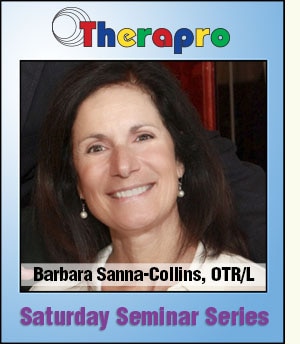Eating a snack or lunch is an essential part of a student’s day at school. For students who have “feeding issues” that limit their participation at snack or lunchtime, a therapeutic feeding program might be appropriate part of their Individualized Educational Plan (IEP). Occupational therapist, Lisa van Gorder addressed this topic comprehensively in Therapro’s Saturday seminar entitled: Working with Feeding Problems in the School Setting. Lisa is the owner and Executive Director of Integrated Children’s Therapies, in Hudson, MA.
Lisa reviewed some basic feeding facts and safety issues that must be considered prior to starting a feeding program. She explained reasons why a child may not eat, which include but are not limited to:
- sensory processing problems
- poor postural stability
- underlying medical issues
She presented an interesting model in describing how discrimination and regulation play a vital role in oral feeding for the child with SPD.
Lisa cautioned that school systems differ widely in the provision of feeding therapy services. How to initiate treating a feeding problem in the school setting begins with a team approach that includes the child, parent, teacher, therapist, and teaching assistant. This group lays the ground rules for treatment, based on the child’s needs and the expectations within the school setting, i.e. 1:1 feeding therapy or addressing the issue within the school cafeteria where the primary goal may be successful socialization.
Lisa walked us through a hypothetical feeding therapy session, and stressed the importance of engagement of the student, which is very dependent on communicating to the student what the therapist will be doing. Touch cues paired with verbal and visual cues help the student feel safe and at ease with feeding therapy. Lisa described a variety of treatment approaches, including food chaining, in her talk. Her jam-packed toolbox includes the many available cups, spoons, straws, food with varied textures, and regulation activities she has found effective, which include suggestions for creating a therapeutic environment in the cafeteria.
Lisa supported her discussion with many cited research studies. She advised that learning to eat is a long process that evolves over time. The school setting may be one place where the child can gain eating skills, as it is an activity that occurs daily at school. However, further feeding support may be necessary with additional therapeutic input from an outpatient facility or clinic.
Take a look at some positive reviews attendees offered:
“I thought it was helpful – I am walking away with some ideas to try on Monday.” Rose O.
“The information was clear, comprehensive, applicable, & interesting.” Anonymous
“The presenter was extremely knowledgeable and realistic. She was very engaging. Thank you!” Melissa M.
Thank you, Lisa!
Filomena Connor, MS, OTR/L
March 14, 2015

